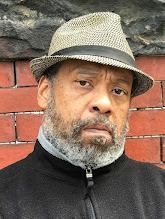Sweet Home Chicago!
Returning to a celebration of U.S. cities in the movies, the Words On Flicks Show is saluting Chicago and its environs this month with special guest (and Chicago native), veteran journalist Demetrius Patterson. We have a special place in our hearts for the Second City, especially in the wake of the Highland Park shooting on July 4.
Demetrius Patterson (aka D.E. Malik Patterson), is a native
Chicagoan (evidenced by the fedora and Kangol hats he wears for just about
every occasion), is an award-winning investigative/business journalist for
various daily newspapers throughout the country, senior staff writer for the
Chicago Defender, jazz music columnist, reviewer of high-end audiophile
equipment, and entertainment media consultant (among other titles within the
profession).
D.E. has over 25 years of journalism and media consulting experience.
Writing about music for various publications, Patterson’s area of expertise
focused mainly on jazz. In the ‘90s and early ‘00s, his syndicated jazz column
on the Gannett News Service wire was highly received by professional musicians
and connoisseurs alike within the genre. He also served as senior staff writer
for iRock Jazz magazine; contributing writer for Black Radio Exclusive magazine
(BRE); senior staff writer and music columnist for N’Digo magazine; and
contributer for Jazziz, among other publications.
In addition, Patterson became an invited contributor to Harvard University/Oxford University Press’ African American National Biography (AANB) series of reference books on the who’s who of Black American culture.
As a senior staff writer
for the Chicago Defender (and the Black Press of America news wire service),
one of Patterson’s main beats was covering then Illinois U.S. Senator Barack
Obama. Patterson had the inside coverage on Mr. Obama during beginning
speculation that the senator might run for president of the United States.
Nationally, however, few people throughout the nation knew much about the
senator. Patterson’s stories gave insights into who the young Black
presidential hopeful was and what his agenda might be. Patterson’s coverage on
soon-to-be President Barack Obama were quoted in some of the largest newspapers
in the country (including the L.A. Times and Washington Post).
Back in the music world, Patterson seemingly has been at the right
place most of the time to have chance meetings in scoring some interviews with
some of the greatest musicians of our time. Notable interviews include Luther
Vandross, Ernie Isley, Nancy Wilson, Max Roach, Abbey Lincoln, Joe Henderson,
Randy Weston, Horace Silver, Von Freeman, Chico Freeman, George Benson, Kyle
Eastwood, George Duke, Brian Blade, Regina Carter, Michael Franks, Phyllis
Hyman, Larry Willis, Wynton Marsalis, Stanley Clarke, Lester Bowie, Michael
Franks and Pat Metheny among others.
Today, Patterson writes about and engages in
enriching conversations regarding all aspects of Black American cultural
influences (including exploring all contributions from the African Diaspora).
Listen to the show here: The Words On Flicks Show: Chi-Town On Film 07/17 by E Water Radio | Entertainment (blogtalkradio.com)

.jpg)
.jpg)

.jpg)
.jpg)
.jpg)
.jpg)













